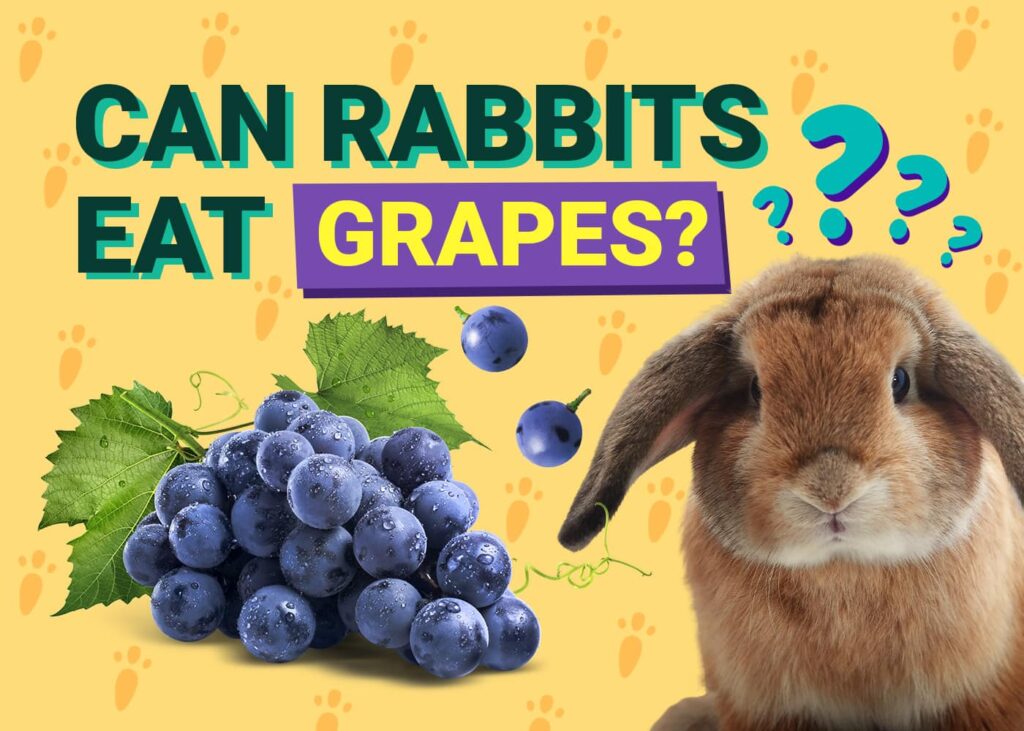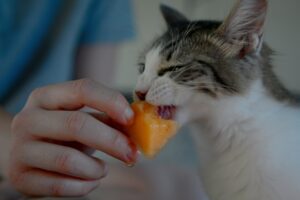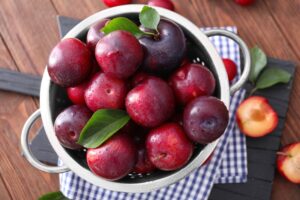VET APPROVED

The information is current and up-to-date in accordance with the latest veterinarian research.
Learn more »Grapes and pets don’t always mix. There is enough scientific evidence to show that grapes are toxic to dogs and cats and can wreak havoc on their kidney health. But what about rabbits? Unfortunately, the information is more limited in this regard. According to some veterinarians and pet experts, grapes are safe for rabbits in moderation. But others, such as the Pet Poison Helpline, warn rabbit owners not to feed this fruit to their long-eared companions due to the potential negative effect on their kidneys.
Let’s take a look at each view so you can make a more informed decision about your little bunny’s next snack.

Are Grapes Safe for Rabbits?
Due to the fact that grapes can seriously damage the kidney health of dogs and cats, the Pet Poison Helpline advises owners to avoid feeding them to rabbits, but this would appear to be precautionary advice only.
An overwhelming number of veterinary experts assert that grapes are not toxic to rabbits, with no evidence of any reported toxicities. In fact, these juicy, sun-kissed fruits contain significant amounts of vitamins A and C, antioxidants, fiber, and calcium. These nutrients and vitamins are beneficial for bunnies and contribute to good gut health, healthy coat and skin, and a strong immune system.
That said, like most fruits, grapes contain a fair amount of sugar, so they should only be offered sparingly.
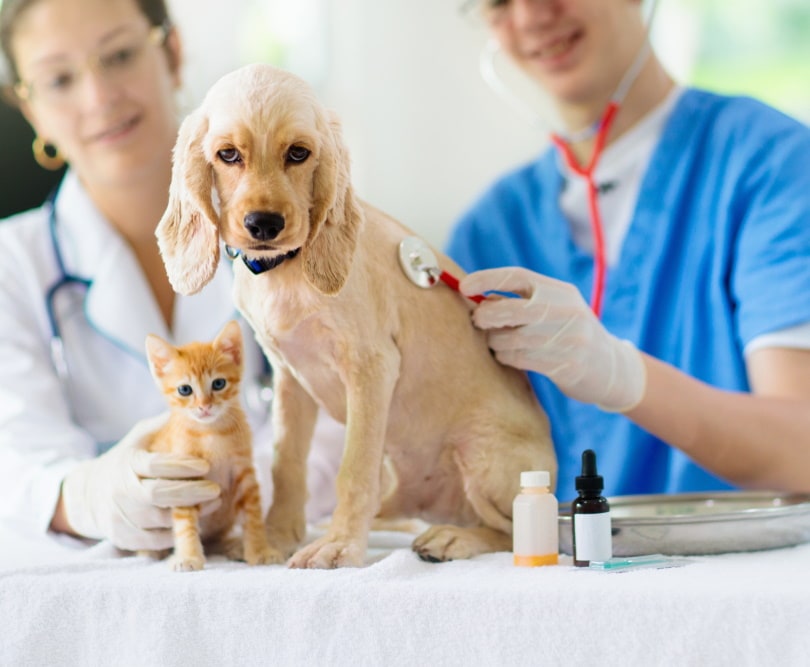
Potential Risks of Grapes for Rabbits
Rabbits have a delicate and complex digestive system, so while grapes are (arguably) not toxic to them, there are still a few risks involved in their consumption.
For one thing, grapes are particularly high in sugar. Besides upsetting your rabbit’s stomach, too much sugar can lead to weight gain and obesity. Also, if a rabbit particularly enjoys the sweet flavor of grapes, they might decide to favor them over their other, more nutritious foods.
Most importantly (and this applies to any new food), if you introduce grapes into their diet too quickly, your rabbit’s normal digestive flora will be disrupted, which can lead to the overgrowth of harmful bacteria. This can cause diarrhea and bloating, which, if left untreated, can lead to dehydration and gut stasis (when a rabbit’s digestion slows or stops), which can be life threatening.
Ultimately, eating too many grapes could have drastic consequences for your long-eared companion. This is why moderation is essential.
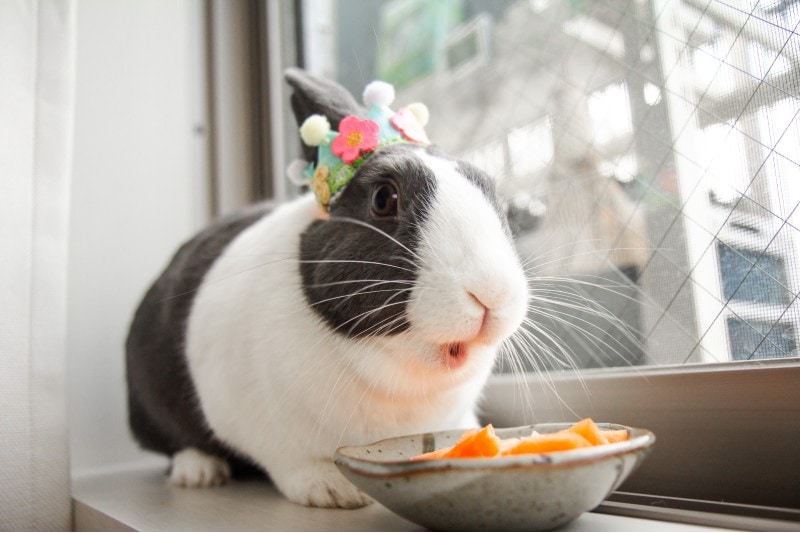
How Many Grapes Can Your Rabbit Safely Eat?
If you choose to offer grapes to your rabbit, the rule of thumb is to stick to a tiny quantity every once in a while. Depending on the size of your pet, a safe amount would be half a grape for small rabbits and a whole grape for large ones. Do not give them more than one or two grapes a month. This way, your bunny shouldn’t suffer from digestive issues. Over time, if your rabbit responds well to this fruit, you can consider slightly increasing the portions.
- Be sure to wash the grapes thoroughly to get rid of any pesticide residue.
- Choose a seedless variety to avoid choking hazards, and cut the grapes in half.
- Monitor your rabbit’s behavior closely, especially if this is their first time eating this food.
- Watch out for signs of possible gastrointestinal issues—like diarrhea—and consult your veterinarian if you have any concerns.
What’s Wrong With Giving Grapes to Dogs and Cats?
We’ve read that grapes are probably non-toxic to rabbits, but let’s briefly review why this fruit is considered toxic to some pets. For dogs, ingesting even just a few grapes can lead to vomiting, diarrhea, abdominal pain, loss of appetite, excessive thirst, and in the worst cases, neurological problems and acute renal failure.
Until recently, the mode of action of grape toxicity in dogs has been unknown. However, a recent case series by vets at the ASPCA Poison Control Center has shed new light on this mystery. Tying together cases of acute renal failure in dogs exposed to tartaric acid, found in cream of tartar, they made the link when they realized that this chemical is also found in grapes. Although further research needs to be done, it would appear that tartaric acid may be the cause of grape toxicity in dogs. As for cats, grape toxicity has been less documented, potentially because fewer cats ingest them, but it does happen.
Another problem with grape toxicity in dogs and cats is that damage to the kidneys may occur at the time of ingestion, but may not be severe enough to result in clinical signs at the time. It may be months, or even years later that the weakened kidneys become a problem, making it less likely that it will be linked to the grapes. Therefore, if you know, or suspect, your dog or cat has eaten grapes, raisins, or sultanas, you should always seek veterinary attention, no matter how small the amount.

Frequently Asked Questions (FAQ)
Can Rabbits Eat the Leaves and Stems of Grapes?
Yes, grape leaves and stems are safe to feed to your rabbit and a good source of fiber. Just make sure to wash them and cut them into manageable pieces.
Can Rabbits Eat Raisins?
No. They’re not toxic, but as the water has been removed, dried fruits like raisins are even more concentrated in sugar and have more calories than fresh fruits.
Can Rabbits Eat Other Fruits?
Yes, they can, albeit in very limited quantities. A small serving once or twice a week is enough. Like grapes, the high sugar content of most fruits (and even some vegetables) can upset your rabbit’s digestive system. Rabbits can safely enjoy most fruits except rhubarb. Just make sure to remove seeds, stones, and rinds before offering them.
What Is the Staple Food for Rabbits?
The best diet for rabbits is one that revolves around hay and fresh vegetables, a limited number of pellets, and the occasional fruit as a sweet treat.
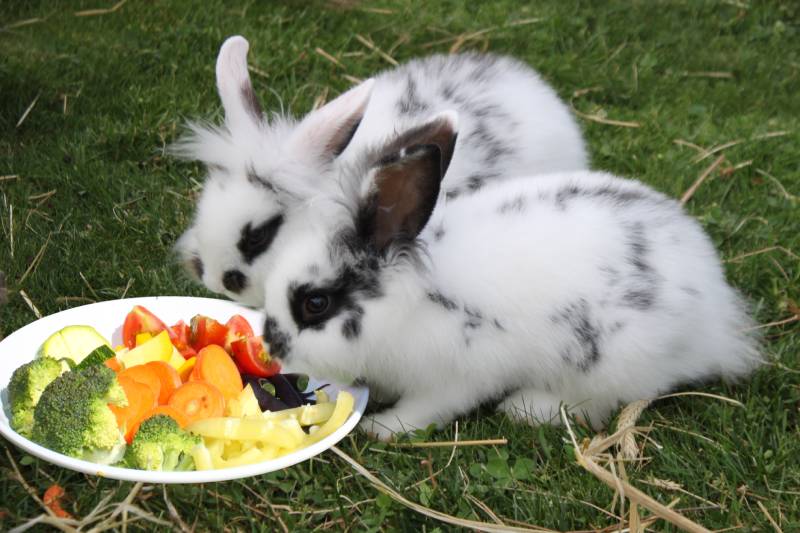

Final Verdict: Can Rabbits Eat Grapes?
There is currently no indication that grapes are toxic to rabbits. That said, the high sugar content of grapes can cause digestive issues for rabbits by altering their gut flora, but provided you stick to one or two grapes a month, the potential risks to your little rabbit’s health should be low to non-existent.
Contents
- Are Grapes Safe for Rabbits?
- Potential Risks of Grapes for Rabbits
- How Many Grapes Can Your Rabbit Safely Eat?
- What’s Wrong With Giving Grapes to Dogs and Cats?
- Frequently Asked Questions (FAQ)
- Can Rabbits Eat the Leaves and Stems of Grapes?
- Can Rabbits Eat Raisins?
- Can Rabbits Eat Other Fruits?
- What Is the Staple Food for Rabbits?
- Final Verdict: Can Rabbits Eat Grapes?

